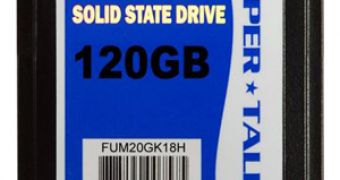About two weeks ago, we wrote an article according to which tests showed that Flash Solid State Drives needed more power to operate than traditional hard disk drives. The tests were conducted by Tom's Hardware, and the news received immediate responses, both from SSD makers and from other sites, like LAPTOP, which conducted their own tests and revealed exactly the opposite Tom's Hardware stated.
The pieces of information were somehow confusing, especially due to the fact that they came one after another, only few days apart. In the meantime, taking a better look at their testing modality, Tom's Hardware decided to run the tests again, and, surprisingly, came back with another result. The truth behind all these is that, while some SSDs drain more battery life, others do not. At the same time, a few SSDs do not take into consideration the amount of power they need to operate only because the level of performance they are able to offer can be considered a characteristic.
While apologizing for the misleading information they gave to their readers, Tom's Hardware also said that the answer actually lies somewhere in between. Newer SSD models are indeed more power efficient than traditional HDDs, while older models need more power and lack the performance burst at the same time. During the first test, the performance level registered by the SSDs influenced the work flow on other components of the system, making them more active, resulting in more power being drained from the battery by the system as a whole.
For the second test, a more accurate one, Tom's Hardware used a script which ensured the same benchmark load on all the devices involved. The new results showed that at least one of the SSDs is much more power efficient than HDDs. And this is a new generation of solid state drives, which means that SSD manufacturers are trust worthy. They did promise that future SSDs would bring more in terms of performance and power efficiency.
OCZ's new SATA II 2.5" SSD, says Tom, is the best product tested in the area. Its performance and energy efficiency rise above other SSDs and HDDs. As said before, other drives have different power requirements, depending on the task. Under heavy load, all SSDs provide more performance-per-watt, even if they need as much power as hard disk drives. When idling or under low load, HDDs would win the competition if it weren't for the OCZ drive.
The final words of the new article Tom's Hardware published on the subject do not give a clear answer. It seems that new testing methodology is required to provide us with a winning team. Since power requirements depend on the device, those willing to purchase a solid state drive should pay a lot of attention to test results and reviews.

 14 DAY TRIAL //
14 DAY TRIAL //